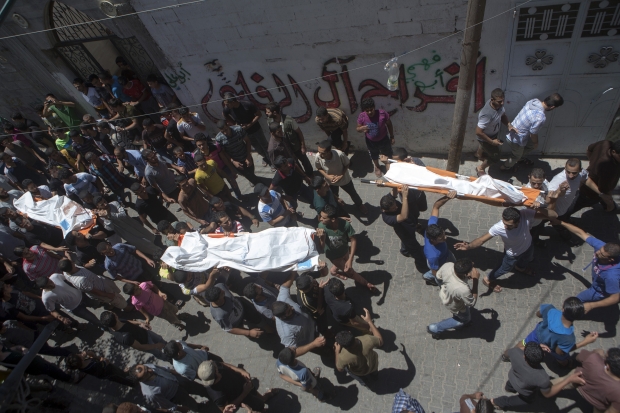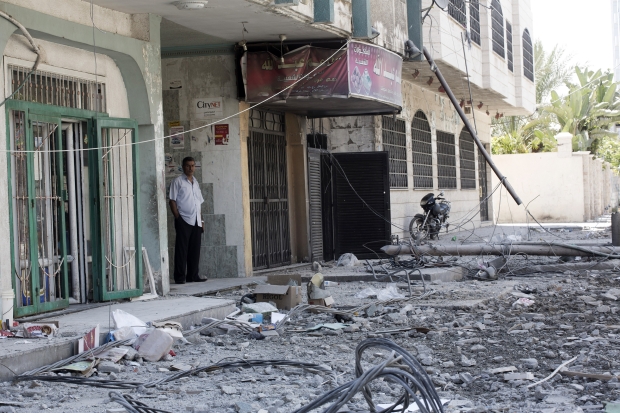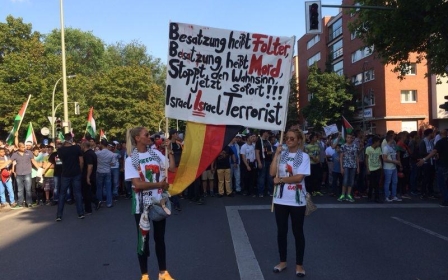Israeli ground invasion instils panic, confusion in Gaza
GAZA CITY - Israeli threats of a massive ground invasion, calls to hundreds of thousands families to evacuate houses all over Gaza, and heavy shelling around all the border areas created panic late on Thursday night.
But even as the intense bombing from the ground, sea, and the air left many injured and killed, the much-dreaded ground invasion turned out to be a relatively limited operation.
Many Gaza residents now insist that, at least in part, the intensity of the invasion was meant to instil a sense of panic and disorientation.
“It was psychological warfare,” Mahmud Aburahme from the al-Mezan Center for Human Rights told MEE.
"All of this was intended to make people think a massive ground invasion was coming.”
The latest Israeli military assault on Gaza, coined Operation Protective Edge, was launched on 8 July, and has claimed the lives of hundreds of Palestinians and two Israelis so far.
The United Nations has advocated a ceasefire, and the UN High Commissioner for Human Rights, Navi Pillay, has called for an investigation into the Israeli bombing of civilian homes, but for now there appears to be no end in sight for the fighting.
Ground offensive: day one
While the ground offensive has thus far been relatively contained, last night’s assault took a heavy toll on Gaza regardless.
The Intez family left their home in the border neighbourhood of Jabal as-Sourani earlier in the day, because they were worried that their tin roof would not protect them from the Israeli shelling.
“In poorer areas and refugee camps where houses are covered with tin, many people die or get injured - hit by debris and shrapnel from bombings,” says Aburahme.
Instead, the Intez's say they stayed in their uncle's house, in Shajjai'ia, on the eastern outskirts of Gaza. Even though the building was close to the border, Salem Intez, a 29 year-old father of two, thought that the concrete walls and proper roof would shield his wife and kids from the fighting.
Feeling reassured by the seeming sturdiness of his new surroundings, Intez left his wife and children to visit another relative. However, just before 9:00 pm local time (19.00 GMT) Intez received a phone call telling him that a tank missile had struck three houses, including the one where his family was staying.
The missile killed Salem's two year-old son, Mohammed, his wife's brother, 23-year-old Abdelal Ali Intez and his 12 year-old brother, Mohammed Ibrahim Intez.
“There were 80 people in those three houses that the missile struck and [the missiles] flew over the heads of sleeping children,” Salem's uncle, Mohammed Saudi told MEE.
Since the attack on the homes, Saudi says he has taken in the survivors, with nearly 100 people now sheltering in his building, once again hoping that the concrete walls will provide some kind of safety.
“It was almost two hundred [people who took refuge in the house] yesterday, but many left in fear, after the shelling,” says Saudi.
It’s not just the constant news of more deaths however, that is having a serious psychological impact on people and almost everyone in Gaza has been hit one way or another.
Shortly after the Intez family was bombed, a separate missile struck a transformer in Sohaja'ia.
Perseverance in the face of fire
But another part of the decision is almost fatalistic and comes from the fear that no one in Gaza is really safe, no matter where they are. Many Gaza residents are quick to recall a January 2009 Israeli strike on the UN-run al-Fakhura School where some 1,300 people had sought refuge. The building was declared a safe haven from the shelling, but this fail to save it and 42 people were killed.
"The night was difficult with all the shelling, but we stayed close together through it. One war, two wars, three wars... people are getting used to it,” the man said, while pointing at the few businesses that have remained open in the area.
As the ground invasion got under way, creeping largely into sparsely populated, mostly agricultural lands, in the north-east of the strip, Sharatha explains that he was almost surprised when the Israelis began shelling his village heavily, just after iftar.
“After my brother's and my neighbour's houses were hit, we had enough and I decided my family had to leave,” says Nasser, while adding that he had never seen anything like that.
Everything was a target, he explains. "Houses, streets, fields were all hit. There were explosions all around us," says Nasser. “We left with nothing, we didn't even lock the doors to our houses.”
According to al-Mezan, at least eight people were arrested in Um al-Nasser by the Israeli military overnight and in the morning and the remaining villagers were evacuated too.
“We don't know what will happen in the future, but let me tell you something - last night was really difficult for people in Gaza, because until the morning, no one knew what was happening,” said al-Mezan Center's Aburahme.
As the ground offensive enters its second day that sense of confusion is still palpable, with residents unsure whether to be more scared of rockets from the sky or soldiers on the ground, or whether fear itself was the worst enemy.
Stay informed with MEE's newsletters
Sign up to get the latest alerts, insights and analysis, starting with Turkey Unpacked
Middle East Eye delivers independent and unrivalled coverage and analysis of the Middle East, North Africa and beyond. To learn more about republishing this content and the associated fees, please fill out this form. More about MEE can be found here.







